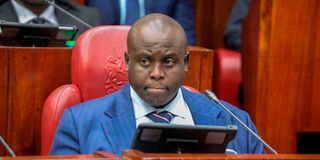Premium
Epra faces MPs' wrath over rising pump prices

Energy and Petroleum Regulatory Authority (EPRA) boss Daniel Kiptoo.
Parliament on Tuesday grilled the energy regulator over the continued rise in pump prices despite a downward trend in crude oil prices.
The National Assembly's Public Investments Committee on Commercial Affairs and Energy asked Energy and Petroleum Regulatory Authority (Epra) Director-General Daniel Kiptoo to explain the rise in local pump prices.
In its latest review of monthly pump prices, Epra increased the price of super petrol by Sh5.72 per litre, diesel by Sh4.48 and kerosene by Sh2.45.
After the review, a litre of super petrol in Nairobi retails at Sh217.36, diesel at Sh205.47 and kerosene at Sh205.06.
Pokot MP David Pkosing, who chairs the committee, said the issue of rising pump prices requires political and economic interventions that go beyond Mr Kiptoo and Epra.
“There are no answers that we expect from Mr Kiptoo. This issue is weighty and requires intervention of the Cabinet Secretary. The Epra gentleman who is tasked with calculating some monthly figures to determine pump prices has no answers,” said Mr Pkosing.
“This is a helpless man. He will not help the people of Kenya. The government-to-government arrangement did not and will not work. We need to grill the Cabinet Secretary for Petroleum, otherwise we are milking a stone.”
Kaloleni MP Paul Katana sparked the debate after demanding to know if pump prices would be reduced in the near future.
“There is a huge outcry by Kenyans following the recent increase of fuel prices by as much as Sh6 per litre,” he said.
“When prices increase, the cost of essential goods shoots up. Are there expectations [that] fuel prices will come down in the near future?”
Mr Katana wanted to know what had become of the government-backed fuel import credit scheme negotiated with the Gulf states.
The scheme, which was initiated by the Kenyan government in partnership with the governments of the United Arab Emirates and Saudi Arabia, is aimed at easing foreign exchange pressure by eliminating the need to purchase fuel, the country's single largest import commodity, on the spot market by deferring the demand for dollars, estimated at $500 million per month.
Under the plan, the National Treasury provides comfort letters - which give a degree of assurance that an obligation will eventually be met - to exporters and local banks for fuel purchases from the governments of Saudi Arabia and the United Arab Emirates.
“We are still in the G-to-G arrangement with the governments of UAE and Saudi Arabia. Government-to-government was meant to reduce prices of fuel and stabilise the shilling against the dollar,” said Mr Kiptoo.
“Yes, there is hope that fuel prices will come down in future because of the nature of oil business where prices go up and down. But we compute monthly pump prices based on a number of parameters.”
Mr Kiptoo, who appeared before the committee to answer audit queries, said if the government-to-government arrangement was not in place, the country would have faced fuel and dollar shortages.
“The G-to-G arrangement has removed a third of the dollar demand in the petroleum sector. We require huge amount of dollars to purchase 550 million litres of petroleum products to meet our monthly demand.”
Rangwe MP Lilian Gogo accused Epra of rushing to increase monthly pump prices without considering the suffering of the majority of poor Kenyans.
“Is there a single day in this country where prices of fuel will come down by a single shilling? You will go down as one of the chief executives who have made Kenyans suffer due to high pump prices,” said Dr Gogo, the committee's vice chairperson.
“In your tenure, Kenyans have really suffered and you should do something drastic to bring down fuel prices.”
However, Mr Kiptoo said Epra has no control over taxes and levies imposed on petroleum, or the landed costs and profit margins, as these are set by law.
“We compute prices based on criteria set in law. We don’t exercise discretion when it comes to setting monthly pump prices,” he said.


